仁爱版英语七年级下册unit7_topic3教材讲解
仁爱版英语七年级下册7B Unit7_Topic3_SectionB_参考教案
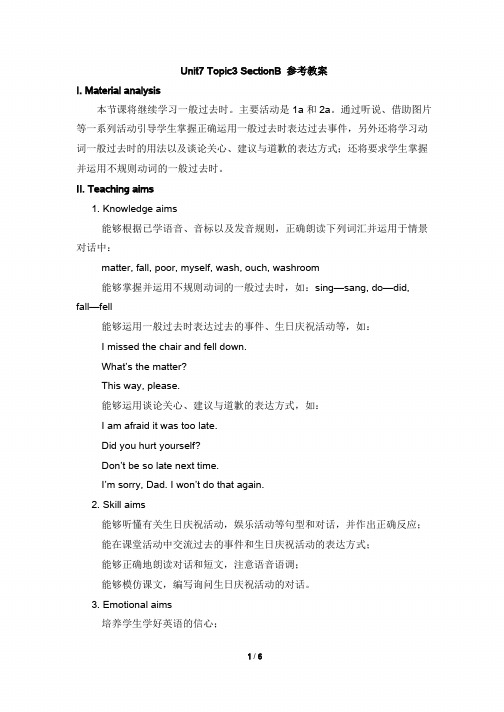
Unit7 Topic3 SectionB 参考教案Ⅰ. Material analysis本节课将继续学习一般过去时。
主要活动是1a 和2a。
通过听说、借助图片等一系列活动引导学生掌握正确运用一般过去时表达过去事件,另外还将学习动词一般过去时的用法以及谈论关心、建议与道歉的表达方式;还将要求学生掌握并运用不规则动词的一般过去时。
Ⅱ. Teaching aims1. Knowledge aims能够根据已学语音、音标以及发音规则,正确朗读下列词汇并运用于情景对话中:matter, fall, poor, myself, wash, ouch, washroom能够掌握并运用不规则动词的一般过去时,如:sing—sang, do—did, fall—fell能够运用一般过去时表达过去的事件、生日庆祝活动等,如:I missed the chair and fell down.What’s the matter?This way, please.能够运用谈论关心、建议与道歉的表达方式,如:I am afraid it was too late.Did you hurt yourself?Don’t be so late next time.I’m sorry, Dad. I won’t do that again.2. Skill aims能够听懂有关生日庆祝活动,娱乐活动等句型和对话,并作出正确反应;能在课堂活动中交流过去的事件和生日庆祝活动的表达方式;能够正确地朗读对话和短文,注意语音语调;能够模仿课文,编写询问生日庆祝活动的对话。
3. Emotional aims培养学生学好英语的信心;鼓励学生积极大胆,敢于模仿,克服不愿或羞于开口的心理。
Ⅲ.The key points and difficult points1. Key points能够熟练掌握并运用不规则动词的一般过去时:sing—sang, do—did,fall—fell 等;能够应用一般过去时表达过去的事件、生日庆祝活动等;能够应用谈论关心、建议与道歉的表达方式。
仁爱版英语七年级下册Unit 7 Topic 3《Everyone had a good time》
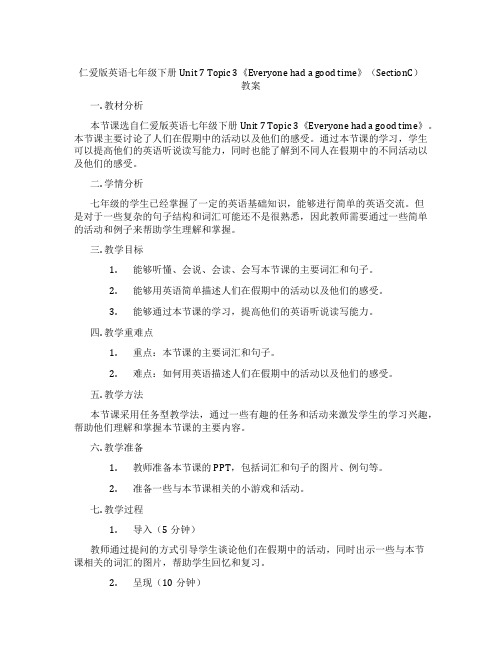
仁爱版英语七年级下册Unit 7 Topic 3《Everyone had a good time》(SectionC)教案一. 教材分析本节课选自仁爱版英语七年级下册Unit 7 Topic 3《Everyone had a good time》。
本节课主要讨论了人们在假期中的活动以及他们的感受。
通过本节课的学习,学生可以提高他们的英语听说读写能力,同时也能了解到不同人在假期中的不同活动以及他们的感受。
二. 学情分析七年级的学生已经掌握了一定的英语基础知识,能够进行简单的英语交流。
但是对于一些复杂的句子结构和词汇可能还不是很熟悉,因此教师需要通过一些简单的活动和例子来帮助学生理解和掌握。
三. 教学目标1.能够听懂、会说、会读、会写本节课的主要词汇和句子。
2.能够用英语简单描述人们在假期中的活动以及他们的感受。
3.能够通过本节课的学习,提高他们的英语听说读写能力。
四. 教学重难点1.重点:本节课的主要词汇和句子。
2.难点:如何用英语描述人们在假期中的活动以及他们的感受。
五. 教学方法本节课采用任务型教学法,通过一些有趣的任务和活动来激发学生的学习兴趣,帮助他们理解和掌握本节课的主要内容。
六. 教学准备1.教师准备本节课的PPT,包括词汇和句子的图片、例句等。
2.准备一些与本节课相关的小游戏和活动。
七. 教学过程1.导入(5分钟)教师通过提问的方式引导学生谈论他们在假期中的活动,同时出示一些与本节课相关的词汇的图片,帮助学生回忆和复习。
2.呈现(10分钟)教师通过PPT展示本节课的主要词汇和句子,同时给出一些例句,帮助学生理解和掌握。
3.操练(10分钟)教师通过一些简单的活动和游戏,帮助学生练习本节课的词汇和句子。
例如,教师可以学生进行角色扮演,让学生用英语描述他们在假期中的活动以及他们的感受。
4.巩固(5分钟)教师通过一些练习题帮助学生巩固本节课的内容。
例如,教师可以让学生完成一些选择题或者填空题,让学生在实践中运用本节课的词汇和句子。
仁爱版英语七年级下册7B Unit7_Topic3_SectionC_参考教案
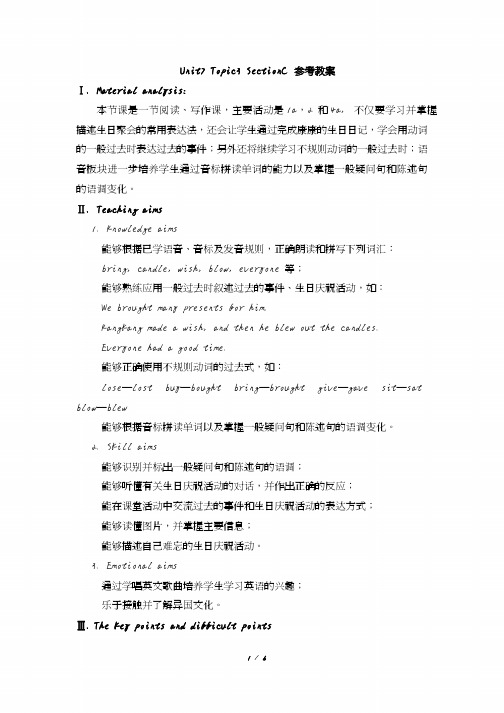
Unit7 Topic3 SectionC 参考教案Ⅰ. Material analysis:本节课是一节阅读、写作课,主要活动是1a,2 和4a, 不仅要学习并掌握描述生日聚会的常用表达法,还会让学生通过完成康康的生日日记,学会用动词的一般过去时表达过去的事件;另外还将继续学习不规则动词的一般过去时;语音板块进一步培养学生通过音标拼读单词的能力以及掌握一般疑问句和陈述句的语调变化。
Ⅱ. Teaching aims1. Knowledge aims能够根据已学语音、音标及发音规则,正确朗读和拼写下列词汇:bring, candle, wish, blow, everyone 等;能够熟练应用一般过去时叙述过去的事件、生日庆祝活动,如:We brought many presents for him.Kangkang made a wish, and then he blew out the candles.Everyone had a good time.能够正确使用不规则动词的过去式,如:lose—lost buy—bought bring—brought give—gave sit—sat blow—blew能够根据音标拼读单词以及掌握一般疑问句和陈述句的语调变化。
2. Skill aims能够识别并标出一般疑问句和陈述句的语调;能够听懂有关生日庆祝活动的对话,并作出正确的反应;能在课堂活动中交流过去的事件和生日庆祝活动的表达方式;能够读懂图片,并掌握主要信息;能够描述自己难忘的生日庆祝活动。
3. Emotional aims通过学唱英文歌曲培养学生学习英语的兴趣;乐于接触并了解异国文化。
Ⅲ.The key points and difficult points1.能够运用一般过去时叙述过去的事件、生日庆祝活动等;2.能够掌握不规则动词的一般过去时,如:lose—lost buy—bought bring—brought give—gave sit—satblow—blew3.能根据音标拼读单词以及掌握一般疑问句和陈述句的语调变化。
仁爱版 七年级英语下册 Unit 7 Topic 3 Section A 课件
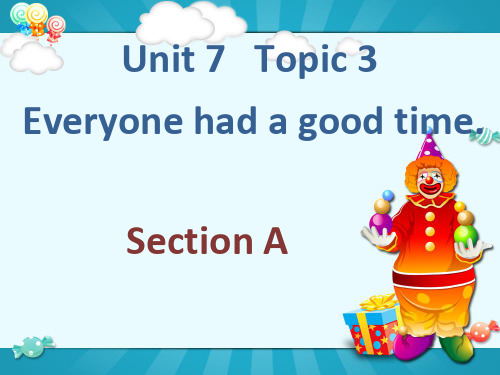
3.miss-- missed
11.stop-- stopped
4.perform--performed 12.plan-- planned
5.live-- lived
13.am-- was
6.hope-- hoped
14.will-- would
7.recite--recited
15.sing-- sang
1l0ibrary
11teachers' office
s1u2 permarket
w1h6 en...was/w ere five
17two years ago
18just now
What
1 swim
2 play pingpong
b3uy junk food s4leep
d5rink water
6 fly a kite
make -- made 做 read -- read 读 ride -- rode 骑 run -- ran 跑步 say -- said 说 see -- saw 看见 sing -- sang 唱 swim -- swam 游泳 take -- took 带;花费... wear -- wore 穿
had--have 有 came--come 去 was--is/am 是
I felt all flushed with fever 我脸颊潮红 embarrassed by the crowd在人群中窘迫不已 I felt he found my letters 我感到他发现了我的心声 and read each word aloud 并且大声读出每字每句 I prayed that he would finish 我祈祷这一幕尽快结束 But he just kept right on但他仍在继续
仁爱版初中英语七年级下册Unit7Topic3课文+单词+知识梳理
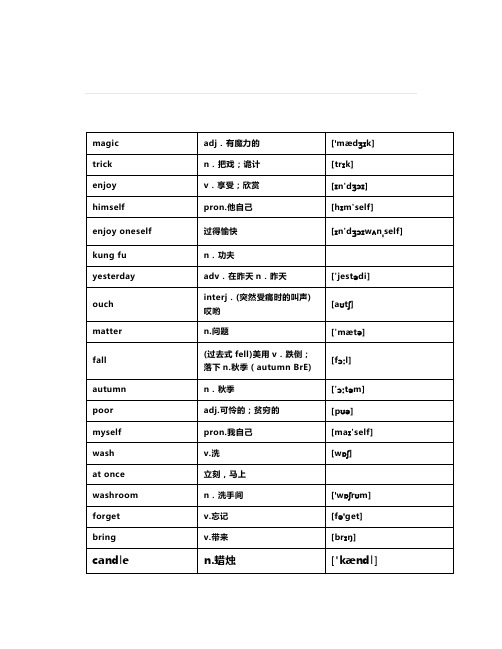
知识梳理:【重点短语】1. recite a poem 背诗2. Perform magic tricks 表演魔术3. Perform kungfu 表演功夫4. It's your turn. 现在轮到你了5. miss the chair 没坐到椅子6. poor Michael 可怜的迈克尔7. Did you hurt yourself? 你摔伤了吗?8. hurt oneself 伤着某人自己9. go and wash them at once 马上去洗一洗10. This way, please. 请走这边。
11. come back 回来12. come back home 回家来13. come back to school 回到学校14. play video games 玩电子游戏15. lie to sb = tell a lie to sb 对某人撒谎16. tell me the truth 跟我说实话17. each of us 我们每个人18. sit around 坐在...周围19. make a silent wish 默默许个心愿20. blow the candles out = blow out the candles 吹灭蜡烛21. in one breath 一口气22. have a big dinner 吃一次大餐【重点句型】1.Did Kangkang enjoy himself?康康玩得开心吗?2.It’s your turn.该你了。
3.What happened to Michael at the party?聚会上迈克发生什么事情了?4.What’s the matter ? 怎么啦?5.This way, please . 请往这边走。
6.We bought many presents for him.我们给他买了许多礼物。
仁爱英语七年级下册Unit7Topic3知识点总结+练习

Every one had a good time.'、教学内容、重点短语at the party 在派对上 perform magic tricks 表演魔术fall dow n 掉下,落下,摔倒,倒塌 hurt on eself 伤了某人自己lots of= a lot of 许多 make sth. by hand 亲手做 blow out 吹灭二、重点句型Did you sing a song at the party? Yes, I did./ No, I didn 'Did you sing a Chin ese song or an En glish song? An En glish song. 3. What ' the matter?4. What time did you come back home last ni ght?二、 ^4言点1 Did Kangkang enjoy himself?康康玩得开心吗?Enjoy 是及物动词,后接名词,代词或是动名词,意为“喜爱,欣赏,享受 ”的乐趣。
”enjoy on eself = have a good/great time 玩得愉快 enjoy doing sth. 喜欢做某事巧辩异同 like, love 与 enjoy (1)like 喜欢(程度较弱)like doing/to do⑵love 热爱(程度较强)love doing/to do(3)enjoy 喜爱,欣赏,享受 ,,的乐趣enjoy doing2.反身代词on eself 变化如下:①第一二人称用形容词性物主代词+self(selves)I T myself you 宀 yourself(yourselves) ②第三人称用人称代词宾格+self(selves) he ^ himself theythemselves四、重点语法---行为动词的一般过去时1. 否定句:didn '+动词原形女口: Jim didn ' t go home yesterday.一般疑问句:在句首加did,句中的动词过去式变回原形。
仁爱版英语七年级下册Unit7_Topic3_SectionA课件

can——could
Do you know these phrases?
sing a song
dance
perform kung fu perform magic tricks
play the guitar
play basketball
1a. Listen, look and say
Look at the pictures and describe them.
3.miss-- missed
11.stop-- stopped
4.perform-- performed 12.plan-- planned
5.live-- lived
13-- could
7.recite-- recited
15.sing-- sang
A. Listen and circle the programs you hear in the program list below.
Program List
1. Guitar playing Jane
2. Dancing
Sally
3. Chinese song Michael
4. Magic tricks Tom
Kangkang_p_e_r_f_o_rm__e_d Chinese kung fu.
Work in pairs. Talk about what each child did at the party.
A: What did ... do at the party yesterday? B: He/She....
Jane_p_l_a_y_e_d_the guitar.
Michael__s_a_n_g__a Chinese song.
仁爱版英语七年级下册Unit 7 Topic 3 Section A 知识解析和练习
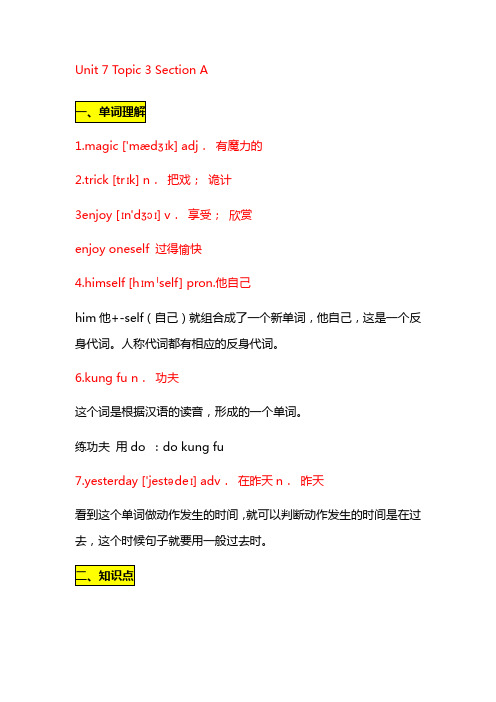
Unit 7 Topic 3 Section A1.magic ['mædʒɪk] adj.有魔力的2.trick [trɪk] n.把戏;诡计3enjoy [ɪn'dʒɔɪ] v.享受;欣赏enjoy oneself 过得愉快4.himself [hɪmˈself] pron.他自己him他+-self(自己)就组合成了一个新单词,他自己,这是一个反身代词。
人称代词都有相应的反身代词。
6.kung fu n.功夫这个词是根据汉语的读音,形成的一个单词。
练功夫用do :do kung fu7.yesterday ['jestədeɪ] adv.在昨天n.昨天看到这个单词做动作发生的时间,就可以判断动作发生的时间是在过去,这个时候句子就要用一般过去时。
1.How was Kangkang's birthday party? 康康的生日聚会怎么样?(1)birthday party 生日聚会(2)How 用于询问怎么样,用于问评价,身体状况,交通方式。
How do you like geography?你认为地理怎么样?(问看法)How are you?你身体好吗?用于问候。
(问候身体状况)How do you usually go to school? 你通常怎样去学校。
(问交通方式)2.It was very nice.非常棒。
这句话用于评价。
It’s very nice of you.你真是太好了。
意思相近的有:It’s very kind/friendly of you.你真友好。
这句话主要用于别人对我们提供了帮助之后,我们进行的一种表示感激的评价。
3.Did you sing a song at the party?你在聚会上唱歌了吗?Yes, I did.是的,我唱了。
(1)这句话是一般过去时的一般疑问句。
肯定句:I sang a song at the party.我在聚会上唱了首歌。
最新仁爱版英语七年级下册unit7-topic3教材讲解

Unit 7 The Birthday PartyTopic 3 We had a wonderful party一、重难点讲解:1、Did Kangkang enjoy himself? 康康玩得愉快吗?(1)enjoy 动词。
喜欢,欣赏,享受……的乐趣,后面接名词、代词动名词。
Eg: Thanks for the great evening.I really enjoyed it . 感谢这美好的夜晚。
我真的玩得很开心。
I enjoy watching TV. 我喜欢看电视。
(2)enjoy oneself = have a good/great/nice/wonderful time 过得快活,玩得痛快。
Oneself 必须与主语相对应。
Eg: They all enjoyed themselves at the party.他们全家在聚会上玩得非常高兴。
enjoy 喜欢enjoin +sth.喜欢某物He enjoyed English.enjoy +doing sth. 喜欢做某事I enjoying playing basketball.enjoy + oneself =have a good/nice/wonderful time过得高兴,玩得开心We enjoyed ourselves yesterday.=We had a good time yesterday.2、It’s your turn.轮到你了。
It’s one’s turn to do sth.该某人干某事了。
Eg: a) It’s your turn to clean the classroom. 该轮到你打扫教室了It’s your turn to sing a song.轮到你唱歌了。
Whose turn is it to cook? 轮到谁做饭了?take turns to do sth / in doing sth. 轮班或依次做某事。
仁爱版英语七年级下册Unit7_Topic3_教材知识详解

Unit7 Topic3 教材知识详解1. Did Kangkang enjoy himself? 康康玩得高兴吗?enjoy 后接名词、代词或动名词,意为“享受……之乐,欣赏,喜爱”。
如:We enjoyed the concert very much.我们非常喜欢这场音乐会。
Thanks for the great party! I really enjoyed it. 感谢这美好的派对!我玩得很开心。
I enjoy reading. 我喜欢看书。
【注意】enjoy oneself = have a good time = have a wonderful time 过得愉快。
如:The children enjoyed themselves at the park yesterday.=The children had a good/wonderful time at the park yesterday. 孩子们昨天在公园玩得很高兴。
【链接】与enjoy同意的近义词有like, love,—般情况下可以通用,但enjoy只能跟名词、代词或动名词,不能接不定式,而love, like均可。
其区别如下:enjoy喜爱、享受……乐趣(具有满足感)。
如:She enjoys listening to music.她认为听音乐是一大乐趣。
like意为“喜欢”,指不反感,但不引起强烈的感情和迫切的愿望。
如:I like having a walk after supper. 晚饭后我喜欢散步。
Do you like to play chess? 你喜欢下棋吗?love意为“热爱”,指引起深厚的、强烈的感情,并有依附感。
如:I love my mother. 我爱我母亲。
2. 一What’s the matter? 怎么啦?一I missed the chair and fell down. 我没坐到椅子上,摔倒了。
仁爱版英语七年级下册unit7topic3教材讲解

Unit 7 The Birthday PartyTopic 3 We had a wonderful party一、重难点讲解:1、Did Kangkang enjoy himself? 康康玩得愉快吗?(1)enjoy 动词。
喜欢,欣赏,享受……的乐趣,后面接名词、代词动名词。
Eg: Thanks for the great evening.I really enjoyed it . 感谢这美好的夜晚。
我真的玩得很开心。
I enjoy watching TV. 我喜欢看电视。
(2)enjoy oneself = have a good/great/nice/wonderful time 过得快活,玩得痛快。
Oneself 必须与主语相对应。
Eg: They all enjoyed themselves at the party.他们全家在聚会上玩得非常高兴。
enjoy 喜欢enjoin +sth.喜欢某物He enjoyed English.enjoy +doing sth. 喜欢做某事I enjoying playing basketball.enjoy + oneself =have a good/nice/wonderful time过得高兴,玩得开心We enjoyed ourselves yesterday.=We had a good time yesterday.2、It’s your turn.轮到你了。
It’s one’s turn to do sth.该某人干某事了。
Eg: a) It’s your turn to clean the classroom. 该轮到你打扫教室了It’s your turn to sing a song.轮到你唱歌了。
Whose turn is it to cook? 轮到谁做饭了?take turns to do sth / in doing sth. 轮班或依次做某事。
最新科普(仁爱)版英语七年级下册Unit7 Topic3 SectionA 【市级优质课一等奖课件】

sing a song
dance
perform kung fu perform magic tricks
play the guitar
play basketball
1a. Listen, look and say
Look at the pictures and describe them.
Listen to 1a and match the activities with the children at Kangkang’s birthday party.
A. Listen and circle the programs you hear in the program list below.
Program List
1. Guitar playing Jane
2. Dancing
Sally
3. Chinese song Michael
4. a_y_e_d_the guitar.
Michael__s_a_n_g__a Chinese song.
Tom_p_e_r_fo_r_m__e_d magic tricks.
At Kangkang’s birthday party yesterday
Maria _p_la_y_e_d_ the piano.
Kangkang_p_e_r_f_o_rm__e_d Chinese kung fu.
Work in pairs. Talk about what each child did at the party.
A: What did ... do at the party yesterday? B: He/She....
Michael__s_a_n_g__a Chinese song.
仁爱版英语七年级下册Unit7Topic3 知识点总结归纳

Unit7 Topic3 Section A学习目标1.学习实义动词的一般过去时的用法。
2.学会用英语提问过去发生的事情。
重点短语1. at the party 在晚会上2.guitar/piano playing 吉他/钢琴演奏3.Perform magic tricks 表演魔术4.Chinese kung fu 中国功夫名师课堂1.-Did you sing a song at the party?你在聚会上唱歌了吗?-Yes,I did.是的,我唱了。
这是一个含有实义动词的一般疑问句,时态是一般过去时,借助于助动词did(do的过去式),把did放在句首,将动词过去式改为动词原形。
答语为Yes,I did./No,I didn't..e.g.-Did you do your homework?你做家庭作业了吗?-Yes,I did./No,I didn't.是的,我做了。
/不,我没有做。
2.-What did Sally do?萨莉做什么了?-She danced.她跳舞了。
这是一个含有实义动词的一般过去时的特殊疑问句,其句型结构为:特殊疑问词+一般疑问句,根据具体情况来回答。
e.g.-Where did you go?你去哪里了?-I went to the library.我去了图书馆。
3.-Did Kangkang enjoy himself?康康玩得高兴吗?-Of course.He was very happy.当然啦,他非常高兴。
(1)enjoy doing sth.喜欢做某事,享受做某事的乐趣。
(2)enjoy oneself=have a good time 过得愉快,玩得高兴。
oneself 为反身代词。
Unit7 Topic3 Section B学习目标1.继续学习实义动词的一般过去时。
2.掌握有关责备的句子,鼓励学生做一名诚实的孩子。
重点短语1.fall down 摔倒2.hurt oneself 伤着某人自己3.at once 立刻,马上4.This way,please 请往这边走5.have a good/great time 玩得很高兴6、next time 下次名师课堂1.-What's the matter?怎么啦?-I missed the chair and fell down.我没坐到椅子上,摔倒了。
仁爱版英语七年级下册Unit 7 Topic 3

仁爱版英语七年级下册Unit 7 Topic 3Section C教学设计江家集镇中学胡晓云一:课题仁爱版七年级英语Unit 7 Topic3 Section3 Kangkang’s birthday party二:教材分析本课出自于《仁爱英语》七年级下册Unit 7 Topic 3 Everyone had a good time这是一节主要要求学生学习和掌握的是行为动词的一般过去时的用法,通过讨论生日宴会这一话题,让学生学习有关过去时的表达方式。
三:学情分析七年级的学生通过前面内容的学习,积累了一定的英语基础知识,掌握了部分英语技能水平。
在学习本课之前,学生在Topic 1和2中已经学习了如何在生日宴会这一特定语境中交流信息,表达简单描述事情的部分句型,并在此基础上再来学习本课的。
四:教学方法1.情景交际法:本课话题源自生活,立足这一点,充分利用学生已有的知识和经验,创设生活化的真实情境,引导学生在运用中学习语言,然后在学习新的语言知识后创造性地运用语言(为用而学,在用中学,学了能用)。
2.任务型语言教学法:设计多种任务活动,提供给学生合作交流的空间和时间,促使学生为完成任务和同学进行合作,为完成任务进行探究学习。
3.开放性教学策略:本人开放性地处理教材,结合教材插入学生感兴趣的图片、电视节目截频图片等,丰富学生知识,拓宽他们视野,实现知识的整合。
五、学习策略:1.自主学习:要求学生采用自主学习的方式,能根据需要进行有目的预习,使其对教师的教学内容起补充作用。
2.合作学习:在与同学合作完成任务的活动中形成合作学习和探究学习的学习方式,引导学生积极思考,善于抓住英语交流的机会。
在活动中相互探讨、相互交流、相互合作,从而获得知识、技能和情感体验,发展他们的能力。
3.通过创设情景和有意义的任务活动,激发学生的学习热情,培养他们的概括和推理能力,发挥他们自己的主观能动性,把被动的学习变为主动学习,让学生巩固所学语言知识。
仁爱版英语七年级下册Unit7Topic3
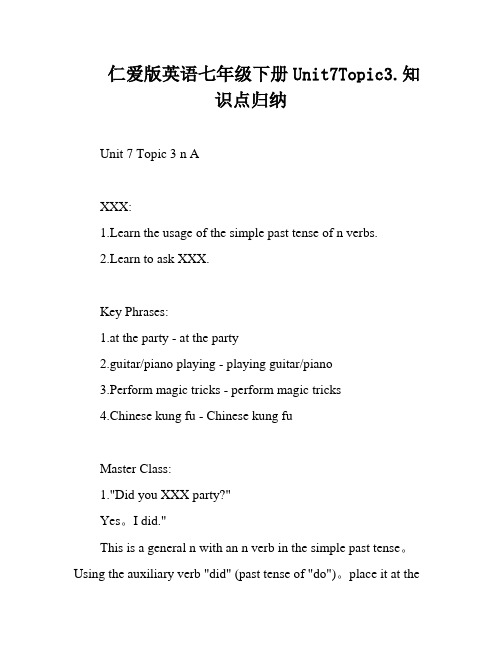
仁爱版英语七年级下册Unit7Topic3.知识点归纳Unit 7 Topic 3 n AXXX:1.Learn the usage of the simple past tense of n verbs.2.Learn to ask XXX.Key Phrases:1.at the party - at the party2.guitar/piano playing - playing guitar/piano3.Perform magic tricks - perform magic tricks4.Chinese kung fu - Chinese kung fuMaster Class:1."Did you XXX party?"Yes。
I did."This is a general n with an n verb in the simple past tense。
Using the auxiliary verb "did" (past tense of "do")。
place it at thebeginning of the sentence and change the verb to its base form。
The answer is "Yes。
I did." / "No。
I XXX't."e.g。
"Did you do your homework?"Yes。
I did." / "No。
I XXX't."2."What did Sally do?"XXX."This is a special n with an n verb in the simple past XXX "n word + general n." Answer according to the specific XXX。
仁爱版七年级下册Unit7Topic3知识全解
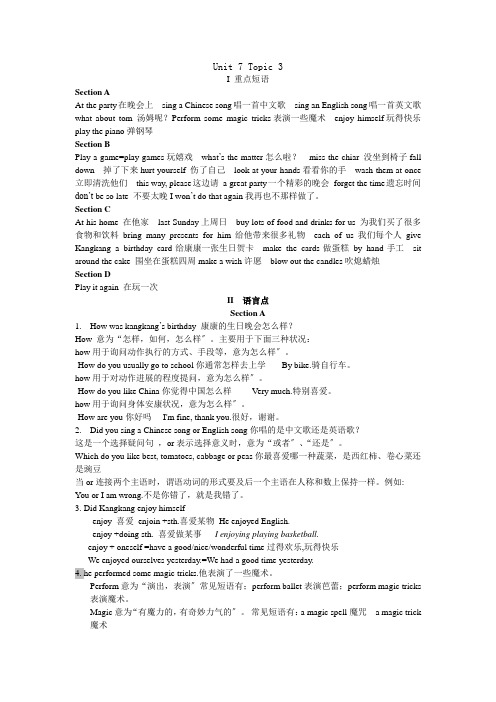
Unit 7 Topic 3I 重点短语Section AAt the party在晚会上sing a Chinese song唱一首中文歌sing an English song唱一首英文歌what about tom 汤姆呢?Perform some magic tricks表演一些魔术enjoy himself玩得快乐play the piano弹钢琴Section BPlay a game=play games玩嬉戏what’s the matter怎么啦?miss the chiar 没坐到椅子fall down 掉了下来hurt yourself 伤了自己look at your hands看看你的手wash them at once 立即清洗他们this way, please这边请a great party一个精彩的晚会forget the time遗忘时间don’t be so late 不要太晚I won’t do that again我再也不那样做了。
Section CAt his home 在他家last Sunday上周日buy lots of food and drinks for us 为我们买了很多食物和饮料bring many presents for him给他带来很多礼物each of us我们每个人give Kangkang a birthday card给康康一张生日贺卡make the cards做蛋糕by hand手工sit around the cake 围坐在蛋糕四周make a wish许愿blow out the candles吹熄蜡烛Section DPlay it again 在玩一次II 语言点Section A1.How was kangkang’s birthday 康康的生日晚会怎么样?How 意为“怎样,如何,怎么样〞。
主要用于下面三种状况:how用于询问动作执行的方式、手段等,意为怎么样〞。
仁爱版七年级下册 Unit 7 Topic 3 课文翻译
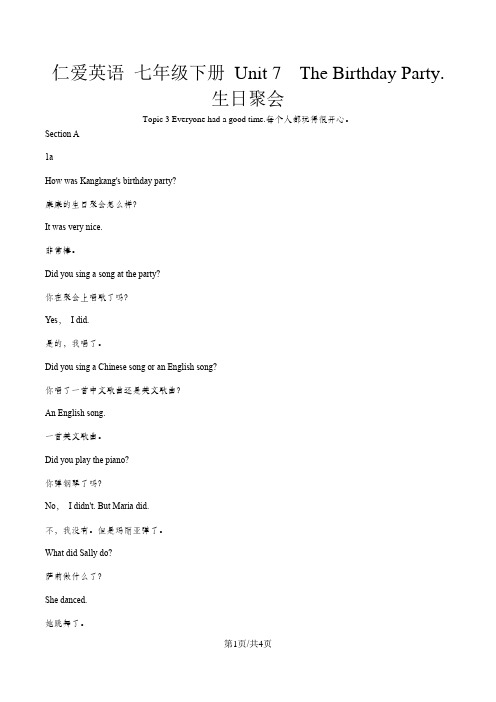
仁爱英语七年级下册Unit 7 The Birthday Party.生日聚会Topic 3 Everyone had a good time.每个人都玩得很开心。
Section A1aHow was Kangkang's birthday party?康康的生日聚会怎么样?It was very nice.非常棒。
Did you sing a song at the party?你在聚会上唱歌了吗?Yes,I did.是的,我唱了。
Did you sing a Chinese song or an English song?你唱了一首中文歌曲还是英文歌曲?An English song.一首英文歌曲。
Did you play the piano?你弹钢琴了吗?No,I didn't. But Maria did.不,我没有。
但是玛丽亚弹了。
What did Sally do?萨莉做什么了?She danced.她跳舞了。
What about Tom?汤姆呢?He performed some magic tricks.他表演了一些魔术。
He likes magic tricks very much.他非常喜欢魔术。
Did Kangkang enjoy himself?康康玩得高兴吗?Of course. He was very happy.当然啦。
他非常高兴。
Section B1aThe children are playing a game at Kangkang's birthday party.学生在康康的生日聚会上玩一种游戏。
Ouch!哎哟!What's the matter?怎么啦?I missed the chair and fell down.我没坐到椅子上,摔倒了。
Poor Michael! Did you hurt yourself?可怜的迈克尔!你伤到自己了吗?No,I didn't hurt myself. I'm OK.没有,我没伤着自己。
仁爱版七年级英语下册Unit 7 Topic 3 Section C课件

1. use wh-questions to ask the things that happened in the past.
e.g. Why did Kangkang like the cards very much? What did the children do at the birthday party?
sit around the cake sat
make a wish made
blow out the candles blew
Look at the pictures and guess what the passage is about. Write the title on the line.
sing sang
nce danced
perform performed
like liked
is
was
play played
miss missed
get got
hurt fall wash come are tell have forget
hurt fell washed came were told had forgot
Everyone had a good time. Jane_p__la_y_e_d_the guitar and Maria played the piano. We__sa_n_g__ many songs. Michael __lo_s_t_the Musical Chairs game. It was very interesting.
a birthday cake — candles — sat around — made a wish — blew out—danced, sang songs, played games — had a good time
- 1、下载文档前请自行甄别文档内容的完整性,平台不提供额外的编辑、内容补充、找答案等附加服务。
- 2、"仅部分预览"的文档,不可在线预览部分如存在完整性等问题,可反馈申请退款(可完整预览的文档不适用该条件!)。
- 3、如文档侵犯您的权益,请联系客服反馈,我们会尽快为您处理(人工客服工作时间:9:00-18:30)。
Unit 7 The Birthday PartyTopic 3 We had a wonderful party一、重难点讲解:1、Did Kangkang enjoy himself? 康康玩得愉快吗?(1)enjoy 动词。
喜欢,欣赏,享受……的乐趣,后面接名词、代词动名词。
Eg: Thanks for the great evening.I really enjoyed it . 感谢这美好的夜晚。
我真的玩得很开心。
I enjoy watching TV. 我喜欢看电视。
(2)enjoy oneself = have a good/great/nice/wonderful time 过得快活,玩得痛快。
Oneself 必须与主语相对应。
Eg: They all enjoyed themselves at the party.他们全家在聚会上玩得非常高兴。
enjoy 喜欢enjoin +sth.喜欢某物He enjoyed English.enjoy +doing sth. 喜欢做某事I enjoying playing basketball.enjoy + oneself =have a good/nice/wonderful time过得高兴,玩得开心We enjoyed ourselves yesterday.=We had a good time yesterday.2、It’s your turn.轮到你了。
It’s one’s turn to do sth.该某人干某事了。
Eg: a) It’s your turn to clean the classroom. 该轮到你打扫教室了It’s your turn to sing a song.轮到你唱歌了。
Whose turn is it to cook? 轮到谁做饭了?take turns to do sth / in doing sth. 轮班或依次做某事。
Eg: b) We take turns to clean the classroom.我们轮流打扫教室They took turns to look after the old man for two years.两年来他们轮班照料这位老人。
3、--What’s the matter? =What’s wrong? = What’s up? 怎么了?(什么事?)--I missed the chair and fell down. 我没坐到椅子上,摔倒了。
fell 是fall的过去式,意为“落下,跌倒”;fall down 摔倒。
(1)fall behind 落后,落在……后面。
Eg: Study hard,or you’ll fall behind the other students.努力学习,否则你会落在其他同学后面。
(2)fall off 从……掉下来Eg: Hellen fell off the bike yesterday. 昨天海伦从自行车上摔下来。
(3) fall asleep 睡熟;fall ill 得了重病Eg: He fell asleep when mother came back.妈妈回来时他睡着了。
The old men fell ill at that time.那时老人病得很重。
4、Did you hurt yourself? 你受伤了吗?hurt 受伤,疼痛。
过去式:hurtEg: He hurt his left leg when he fell off his bike.他从自行车上摔下时,弄伤了左腿。
My knee hurts,my foot hurts and my head,too.我的膝盖疼,脚疼,头也疼。
hurt oneself 伤了某人自己。
hurt adj.受伤的,伤疼的You mustn’t move someone if they’re badly hurt.如果伤势太重,千万别移动他们。
5、Go and wash them at once.马上去洗手。
⑴and 连接两个动词,表示并列关系,前后两个动词形式要一致。
Eg: Go and open the door.去开门。
⑵at once = right now =right away立刻,马上。
You must close the door at once/right now/right away.你必须马上关上门。
6、What happened to Michael at the party?迈克尔在聚会上发生了什么事?⑴happen(偶然)发生。
What time did the accident happen?事故是什么时候发生的?What would happen if your parents find out.如果你父母发现了,会怎么样呢?⑵happen to sb.(事件)发生在某人身上。
I want to know what happen to Jane?我想知道简发生了什么事?⑶what happen to sb/sth.某人或某物怎么了?语义相同的句式有:What’s the matter/the trouble/wrong/up with sb/sth.Gao Wei didn’t go to school today. what’s the matter/the trouble/wrong/up with him?高伟今天没来上课,他怎么了?7、How can you lie to me?你怎么能对我撒谎呢?lie v.撒谎,其过去式为lied,现在分词是lying。
lie to sb.=tell a lie to sb.向某人说谎a) Don’t lie to your parents.对某人撒谎。
lie n. 谎言,构成词组tell lies/tell a lie/tell sb a lie.Judy told a lie to his father yesterday. =Judy lied to his father yesterday.朱迪昨天向他爸爸撒了个谎。
lie 作为动词时,还可以指“躺,位于”,其过去式为lay.He lay down on the sofa and soon fell asleep.他躺在沙发上很快睡着了。
8、Why didn’t you tell me the truth?你为什么不跟我说实话呢?⑴truth 事实,真相,实际情况。
We are all surprised at the truth of the event.我们都对事件的真相感到震惊。
⑵tell sb the truth 跟某人说实话,向某人坦白。
You should tell the policeman the truth if you know.如果你的确知道实情,你应该向警察坦白。
9、Everyone had a good time at the party and forgot the time,so….聚会上每个人都玩的很开心(我们都)忘记了时间,结果….⑴everyone 每人,人人,所有人= everybody.作为主语时,谓语动词用第三人称单数形式。
Everyone is here.所有人都在这儿。
⑵so因此,所以,结果等,同 and、but、on一样用来连接并列句。
但so引出的句子是前一句所叙述的事件导致的结果。
I got up late this morning,so I was certainly late for school.我今天起床晚了,所以我上学必然就迟到了。
10、It made her father very angry.这使得她爸爸很生气。
⑴made是使役动词make的过去式,意为“使得”,常见句式为:make sb/sth +形容词。
The news made him very happy.这消息使他非常开心。
⑵angry 生气的,愤怒的。
The farmer was very angry at the news.这位农民对这则消息感到非常气愤。
be angry with sb对某人很生气;be angry at sth.对某事很生气。
注意区别两个短语所用介词的不同。
Xiao Ming didn’t go to school yesterday,his father was very angry with him.小明昨天没去上学,他爸爸很生他的气。
The boy was always late for class,so his teacher was angry at this.这个男孩上课总迟到,对此老师很生气。
11、We made the cards by hand.我们手工制作了这些卡片。
by hand 用手工。
介词by表方式,意思是“用”,后面常跟抽象名词或动名词,构成的短语表示完成某活动的方式、途径、手段等。
He set an example to the other students by doing this.他这样做为其他同学树立了榜样。
⑴in表手段,意思是“用”,后面常跟有关语言和材料的词语。
He can sing in English.他会唱英文歌。
He can write in pencil.他能用铅笔写字。
⑵with 表工具,意思是“用”,后面常跟有关的工具。
eg: We often write with pens.我们常用钢笔写字。
We see with our eyes. 我们用眼睛看。
12 、Each of us gave Kangkang a birthday card, too. 我们每个人又送给康康一张生日卡片。
each of us意为“我们每个人”。
⑴each of/ each one of / every one of 后接复数名词或代词,作主语时,谓语动词通常用单数。
如:Every one of them is going to plant trees. 他们每个人都打算去植树。
⑵each,every“每一个”each表示一定数目中的每一个,强调个人或个别。
指两者或两者以上中的每一个。
a) E ach student is here.每个学生都到了every表示数目不确定的许多人或物中的每一个,强调整体。
指三者或以上中的每一个b) Every student is here.所有的学生都到了13、His parents bought lots of food and drinks for us. 他父母给我们买了许多食物和饮料。
